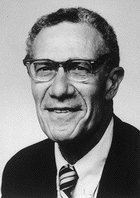 Robert Solow is one of the major figures of the Neo-Keynesian Synthesis macroeconomics. Together with Paul Samuelson, he formed the core of the M.I.T. economics department which has been widely viewed as the ‘mainstream’ of the post-war period. Together, Robert Solow and Paul Samuelson have contributed to various landmark pieces of work: e.g. on von Neumann growth theory (1953), on capital theory (1956), on linear programming (1958) and on the Phillips Curve (1960).
Robert Solow is one of the major figures of the Neo-Keynesian Synthesis macroeconomics. Together with Paul Samuelson, he formed the core of the M.I.T. economics department which has been widely viewed as the ‘mainstream’ of the post-war period. Together, Robert Solow and Paul Samuelson have contributed to various landmark pieces of work: e.g. on von Neumann growth theory (1953), on capital theory (1956), on linear programming (1958) and on the Phillips Curve (1960).
Individually, Robert Solow is best known for his work on the neo-classical growth model (1956, 1970). His use of an aggregate production function in that paper launched the Cambridge Capital Controversy with pitted Solow and Samuelson against Joan Robinson and the Cambridge Keynesians. His various papers on the issue of capital bear out the magnitude of the problem (1963, 1967).
In turn, Solow also got imbroiled with Nicholas Kaldor on the issue of growth and technological progress (1957, 1960). He was also one of the co-inventors of the constant elasticity of substitution (CES) production function (1961). He is also responsible for exploring and popularizing the ‘long-run multiplier’ derived from a dynamic government budget constraint. (1973)
It was Solow’s work on growth that earned him a Nobel Memorial prize in 1987.
Major Works of Robert Solow
– On the Structure of Linear Models, 1952, Econometrica
– Balanced Growth under Constant Returns to Scale, with P.A. Samuelson, 1953, Econometrica
– A Complete Capital Model Involving Heterogeneous Capital Goods, with P.A. Samuelson, 1956, QJE
– A Contribution to the Theory of Economic Growth, 1956, QJE
– Technical Change and the Aggregate Production Function, 1957, REStat
– Linear Programming and Economic Analysis, with R. Dorfman and P.A. Samuelson, 1958
– Analytical Aspects of Anti-Inflation Policy, with P.A. Samuelson, 1960
– Investment and Technical Progress, 1960, in Arrow, Karlin & Suppes, editors, Mathematical Models in Social Sciences
– Capital Labor Substitution and Economic Efficiency, with K.J. Arrow, H. Chenery and B.Minhas, 1961, REStat
– Substitution and Fixed Proportions in the Theory of Capital, 1962, RES
– Capital Theory and the Rate of Return, 1963
– Heterogeneous Capital and Smooth Production Functions: An experimental study, 1963, Econometrica
– Neoclassical Growth with Fixed Factor Proportions, with J. Tobin, C.C. von Weizsacker and M. Yaari 1966, RES
– The Interest Rate and Transition between Techniques, 1967, in Feinstein, editor, Socialism, Capitalism and Economic Growth
– Output, Employment, and Wages in the Short Run, with J.E. Stiglitz, 1968, QJE
– Growth Theory: An exposition, 1970
– Does Fiscal Policy Matter?, with A.S. Blinder, 1973, Journal of Public Economics
– Analytical Foundations of Fiscal Policy, with A.S. Blinder, 1974, in Blinder et al., The Economics of Public Finance
– The Economics of Resources or the Resources of Economics, 1974, AER
– Intergenerational Equity and Exhaustible Resources, 1974, RES
– Alternative Approaches to Macroeconomic Theory: A partial view, 1979, Canadian JE
– On Theories of Unemployment, 1980, AER
– Growth Theory and After, 1988, AER
– Money, Inflation and Growth, with A. Orphanides, 1990, in Friedman and Hahn, editors, Handbook of Monetary Economics
– Made in America, 1989, with M. Dertouzos and R. Lester
– Critical Essay on Modern Macroeconomic Theory, with F.H.Hahn, 1995
– What is Labor Market Flexibility: What is it good for?, 1997, Proceedings of the British Academy
– Judgemental Cuts in Consumer Price Indexation Are a Bad Idea, with K. Arrow and J. Tobin, 1997, FAS
– The Nature of Consumer Price Indices, 1997, FAS
– Learning from ‘Learning by Doing’: Lessons for Economic Growth, 1997
– Work and Welfare, 1998
– Monopolistic Competition and Macroeconomic Theory, 1998
– Inflation, Unemployment, and Monetary Policy with John Bigelow Taylor, 1998
– Monopolistic Competition and Macroeconomic Theory, 1999
– On Golden Pond, 1999, NY Review of Books
– Neoclassical Growth Theory, 2000, in Taylor and Woodford, editors, Handbook of Macroeconomics
– Welfare: The Cheapest Country, 2000, NY Review of Books
– Economies of Truth: Review of Jacobs, 2000, New Republic

What i don’t realize is in truth how you are not actually a lot more smartly-liked than you might be right now. You’re so intelligent. You understand therefore considerably when it comes to this topic, made me individually imagine it from so many various angles. Its like men and women aren’t involved until it’s something to accomplish with Girl gaga! Your individual stuffs great. Always care for it up!